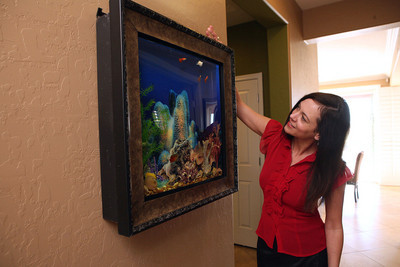Harmony in the Home

It’s true, there’s no place like home. It’s the place where you begin and end each day. It’s where you prepare and eat most of your meals. It’s where you sleep. It’s where you seek refuge from the hustle and bustle of the daily grind. It’s where you display your most prized possessions. And it’s where you let your style shine.
Creating a place that does so many things can be a challenge. That’s where the services of an interior designer or decorator come in.
But today’s interior designers and decorators can do more than just help you pick out pleasing color swatches, durable flooring and functional furniture. Using various philosophies and schools of design, a home’s interior can help its inhabitants find and create more harmony and balance in their lives.
Perhaps the most well-known of these schools of thought is feng shui, which uses ancient Chinese principles of placement and arrangement to achieve harmony within an environment.
The goal of feng shui is to create an environment that makes life easier, said Rochiel Wallers, a certified feng shui consultant and owner of Feng Shui Design Solutions in Las Vegas.
Wallers studied at the Feng Shui Institute of America and has trained in pyramid, black hat, compass and land form schools of feng shui since 1995.
Sometimes, however, feng shui principles can conflict with a person’s inherent nature, she added. For example, removing clutter as directed by traditional feng shui methods could actually diminish a person’s sense of safety.
Because there are so many factors that influence a person’s well-being, Wallers also specializes in holistic interior decorating.
"Holistic interior decorating is about creating nurturing therapeutic environments. When a home expresses positive messages and symbolism it is energizing. Positive surroundings create positive futures," she said.
Intensely individualized to support each person’s needs, the interiors designed by Wallers are created using a variety of tools, among them a system of image diagnostics or archityping, which she said is a science-based test developed in 1999 at Harvard University to determine how a person feels in a specific space and reacts to situations.
Additionally, Wallers offers a simple test that reveals which elements — water, wood, fire, earth or metal — are dominant in a person’s life and how they can be represented to achieve a healthy lifestyle.
"I get a good idea of how you relate to a space and what you need in that space to feel safe and healthy," she said.
Using her own test results as an example, Wallers said she is a wood person who needs water elements to help her maintain balance. As a result, she has a fountain near the front entrance of her home and a pool in her backyard.
The basic elements can be represented by colors and specific materials, which are introduced into a home’s décor — or removed — as needed to create balance.
Wallers said she has met many people who are more comfortable with the holistic approach because it is based on science, versus feng shui, which is based on philosophies and cultural practices. She said holistic interior decorating addresses all five senses, alleviates fatigue, increases productivity and mood, and improves overall health.
Also striving to create a sense of harmony and positive influences on a person’s life is Tina Dyba, owner of D.I.V.A. Concepts in Las Vegas. Through her experience as a decorator, Dyba has developed a new design concept called "elemental fusion," which brings elements of nature into the home to create harmony and a tranquil feeling.
By focusing on function of space, lighting sources, colors, textures and patterns, elemental fusion will help create an environmental where the mind and body can work together successfully.
She accomplishes this by introducing colors found in nature, such as earth tones and shades of blue and green; various textures; images of items such as leaves and flowers; and elements such as water and plants into her décors.
"You want to create a balance between color, texture and pattern," she said, noting designs also have to take into account the natural environment. For example, here in the desert, where it is dry, water features should be incorporated into the home’s décor, but in Portland, Ore,. where there is a lot of natural water, elements representing water should be limited and items representing fire and earth such as candles and rocks, respectively, should be featured.
Dyba believes that to fully incorporate elemental fusion into one’s home, a person must also have an organized lifestyle, believe in God, lead a healthy life, strive toward financial freedom, set goals and be able to express oneself.
She said she has honed her skills throughout her life. In addition to studying at the Art Institute of Pittsburgh and College of Southern Nevada, Dyba said she learned about good designs while working for architecture firms and when she was a real estate agent before opening her design firm, D.I.V.A., which stands for Designing Is Vision with Attitude.
Additional information about the benefits of feng shui and holistic interior decorating is available at www.fengshui-designsolutions.com. For more information about elemental fusion, visit www.divaconceptsinc.com.












